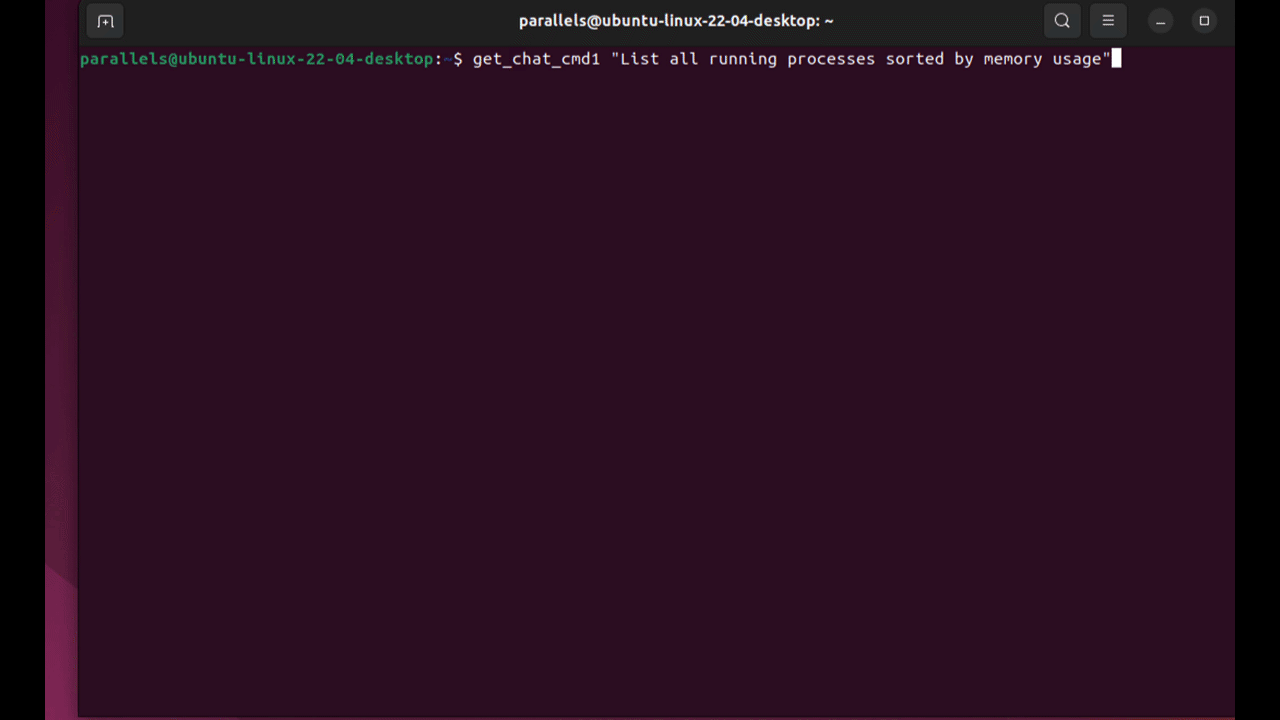Inspired by my PowerShell "get-chat-cmd" project here.
Generate bash commands from natural language using AI APIs directly from your terminal. This project provides bash functions that interact with OpenRouter, OpenAI, Anthropic, and locally-hosted AI models (like those served by LM Studio or Ollama).
- Multiple AI Providers: Supports OpenRouter, OpenAI, Anthropic, and locally-hosted models.
- Bash-Idiomatic: Designed for standard bash environments (Linux, macOS, WSL - only tested so far on Ubuntu 24.04 LTS).
- Natural Language Input: Describe the command you need in plain English.
- Clipboard Integration: Automatically copies the generated command to your clipboard (optional, requires
xclip,pbcopy, orclip.exe). - Configurable: Use a configuration file for API keys and settings.
- Minimal Dependencies: Primarily uses standard bash features and common utilities (
curl/wget,jq/python).
NOTE: you must have your own API keys with all 3 AI providers to use all features, as-written. If you are new to using API calls in the bash terminal, info on obtaining API keys is below. You can also choose to only use a single AI provider or make API calls to your own locally-hosted Chat model (via get-chat-local which supports LM Studio and Ollama).
If you do not know how to locally-host your own Chat models and don't like the idea of giving "big AI" your money: might I suggest Openrouter.ai which is a fantastic gateway for many different free and paid models, and their pricing for "big AI models" is usually resonable.
This solution is intented to run with most major Linux distros and MacOS, but so far I have only tested with Ubuntu 24.04 LTS. Engineers & Vibe-Coders listen-up: see disclaimer below or the license-agreement. This code is NOT tested in, or intended for, any prod environment.
-
Download the Script:
# Choose a location, e.g., ~/.local/bin or ~/scripts mkdir -p ~/scripts cd ~/scripts # Download using curl curl -o ai_bash_commands.sh https://raw.githubusercontent.com/J-DubApps/get_chat_cmd/main/ai_bash_commands.sh # OR download using wget # wget -O ai_bash_commands.sh https://raw.githubusercontent.com/J-DubApps/get_chat_cmd/main/ai_bash_config.sh.example/ai_bash_commands.sh chmod +x ai_bash_commands.sh
-
Source the Script: Add the following line to your
~/.bashrcor~/.zshrcfile (note on MacOS the default is Zshell (zsh) may use~/.zprofileinstead of~/.zshrc)source ~/scripts/ai_bash_commands.sh
(adjust the path above if you downloaded the .sh file elsewhere)
Restart your shell or run
source ~/.bashrc(orsource ~/.zshrc). -
Configure API Keys:
- Copy the example configuration file:
mkdir -p ~/.config # Download using curl curl -o ~/.config/ai_bash_config.sh https://raw.githubusercontent.com/J-DubApps/get_chat_cmd/main/ai_bash_config.sh.example # OR download using wget # wget -O ~/.config/ai_bash_config.sh https://raw.githubusercontent.com/J-DubApps/get_chat_cmd/main/ai_bash_config.sh.example
- Edit
~/.config/ai_bash_config.shand add your API keys. - Secure the file:
chmod 600 ~/.config/ai_bash_config.sh
- Copy the example configuration file:
-
Install Dependencies (Optional but Recommended):
- jq: For robust JSON parsing.
# Debian/Ubuntu sudo apt update && sudo apt install jq -y # Fedora/CentOS/RHEL sudo dnf install jq -y # macOS (using Homebrew) brew install jq
- Clipboard Tools: For automatic copying.
- Linux (X11):
xclip# Debian/Ubuntu sudo apt update && sudo apt install xclip -y # Fedora/CentOS/RHEL sudo dnf install xclip -y
- macOS:
pbcopy(usually pre-installed) - WSL:
clip.exe(usually available)
- Linux (X11):
- jq: For robust JSON parsing.
Once installed and configured, you can use the functions directly in your terminal:
# Using OpenRouter (Default: quasar-alpha)
get_chat_cmd1 "List all running processes sorted by memory usage"
# Using OpenAI (Default: gpt-4o-mini)
get_chat_cmd2 "Find files modified in the last 24 hours"
# Using Anthropic (Default: claude-3-haiku)
get_chat_cmd3 "List all running processes"
# Using Local Model
get_chat_local "Show disk usage for the current directory" The generated command will be displayed in the terminal and (if clipboard tools are available and enabled) copied to your clipboard.
- Implement core utility installer (API requests, JSON parsing, clipboard, dependency checks).
- Refine prompt engineering for better accuracy.
- Add comprehensive error handling.
- Add testing across different environments.
You can create accounts and obtain API keys inexpensively from these links:
https://openrouter.ai/keys
https://platform.openai.com/api-keys
https://console.anthropic.com/settings/keys
The functions provided in this repository are intended to assist in generating PowerShell commands through AI models in a test environment only and they are not intended for use in any production scenario. Users are responsible for reviewing and understanding the commands generated before execution. The author assumes zero liability for unintended consequences resulting from the use or misuse of these functions, including but not limited to poor-prompting which might create undesired command outputs. Additionally, the author is not responsible for any API usage charges incurred while using these functions. Users should monitor their API usage to avoid unexpected costs.
This project is licensed under the MIT License:
MIT License
Copyright (c) 2025 Julian West
Permission is hereby granted, free of charge, to any person obtaining a copy of this software and associated documentation files (the “Software”), to deal in the Software without restriction, including without limitation the rights to use, copy, modify, merge, publish, distribute, sublicense, and/or sell copies of the Software, and to permit persons to whom the Software is furnished to do so, subject to the following conditions:
The above copyright notice and this permission notice shall be included in all copies or substantial portions of the Software.
THE SOFTWARE IS PROVIDED “AS IS”, WITHOUT WARRANTY OF ANY KIND, EXPRESS OR IMPLIED, INCLUDING BUT NOT LIMITED TO THE WARRANTIES OF MERCHANTABILITY, FITNESS FOR A PARTICULAR PURPOSE AND NONINFRINGEMENT. IN NO EVENT SHALL THE AUTHORS OR COPYRIGHT HOLDERS BE LIABLE FOR ANY CLAIM, DAMAGES OR OTHER LIABILITY, WHETHER IN AN ACTION OF CONTRACT, TORT OR OTHERWISE, ARISING FROM, OUT OF OR IN CONNECTION WITH THE SOFTWARE OR THE USE OR OTHER DEALINGS IN THE SOFTWARE.
For more details, refer to the MIT License. oai_citation_attribution:0‡Wikipedia
